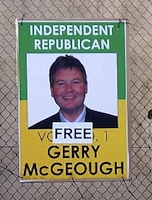
A senior loyalist is to be called to give evidence at the trial of a former IRA prisoner following claims that the British government agreed a secret ‘amnesty’ for the IRA and loyalist pamilitaties.

Progressive Unionist Party spokesman William Smith claimed yesterday that the late British Direct Ruler Mo Mowlam gave assurances in 1998 that no-one would be prosecuted for offences committed before the signing of the Good Friday Agreement in April of that year.
Lawyers for County Tyrone republican Gerry McGeough, who is on trial on IRA charges dating from 1981, say they now intend to call Smith to give evidence in the case.
McGeough was arrested in March 2007 at an assembly election count in Omagh.
At the opening of his trial earlier this month, his defence said the British government had granted pardons to allow dozens of republicans in hiding to return home after 1998.
McGeough’s lawyers argue that he should be entitled to the same arrangements and that his arrest was “politically motivated”.
British Direct Ruler Shaun Woodward denied there was any secret deal for those who face outstanding conflict-related prosecutions, the so-called ‘on the runs’ (OTRs).
The British government said it had “not been in the public interest” to prosecute certain former IRA Volunteers, but denied that politics had played any part in the decision. There has been no public explanation of the variable implementation of the policy. Mr McGeough ran as an independent republican candidate at the last local elections, before being arrested at the election count centre.
William ‘Plum’ Smith yesterday insisted that the British government had agreed an amnesty deal with the IRA, INLA and loyalist paramilitaries which it had now broken.
Mr Smith, who acted as a spokesman for loyalist prisoners, claimed Ms Mowlam had given assurances during the Good Friday Agreement that the government would not prosecute paramilitaries for offences committed prior to 1998.
“The word ‘amnesty’ would provoke a massive negative reaction which the British government felt they couldn’t live with at that time,” he said.
“That’s why it wasn’t explicitly expressed in the agreement but that was a clear understanding endorsed by Mo Mowlam on behalf of the British government,”
Smith said he was left “under no illusion or ambiguity” that all prisoners would be released within two years and that no loyalist, republican or member of the security forces would be pursued for previous offences.
The senior loyalist accused the government of reneging on the deal after 20 loyalists appeared in court in recent months charged with murder and other serious offences.
However, British officials said the majority of these offences, connected to the activities of the notorious Mount Vernon UVF, took place after 1998 and are not covered by the Good Friday Agreement.
In the 26 Counties, a number of republicans have appeared in court charged with offences which occurred prior to the Good Friday Agreement.
In the most high-profile case relating to pre-Good Friday Agreement offences, five IRA men were jailed in June 1999 over a raid which led to the tragic death of Garda Jerry McCabe. Despite the offences having taken place two years before the 1998 agreement, the last of the five were not freed until August last year.
In June 1998 former IRA leader inside Long Kesh prison, Brendan ‘Bik’ McFarlane was arrested by garda police and charged with an IRA offence dating from 1993. A 10-year legal battle followed before the case against the Belfast man finally collapsed after evidence was ruled inadmissible.
Mr McGeough’s lawyer Peter Corrigan last night confirmed that he intends to call the senior loyalist as a witness in his trial.
“Our case is that the government gave assurances to loyalists and republicans that it would not seek prosecutions in relation to pre-1998 offences,” he said.
“Mr Smith was one of the people given these government assurances and we believe that his testimony will prove that the case against my client breaks that agreement and is politically motivated.”
![[Irish Republican News]](https://republican-news.org/graphics/title_gifs/rn.gif)
![[Irish Republican News]](https://republican-news.org/graphics/title_gifs/harp.gif)

